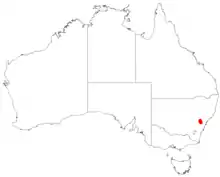Leptospermum blakelyi
Leptospermum blakelyi is a species of shrub that is endemic to rocky clifftops near Lithgow in New South Wales. It has densely silky young stems, egg-shaped to elliptical leaves and white or pink flowers.
| Leptospermum blakelyi | |
|---|---|
| Scientific classification | |
| Kingdom: | Plantae |
| Clade: | Tracheophytes |
| Clade: | Angiosperms |
| Clade: | Eudicots |
| Clade: | Rosids |
| Order: | Myrtales |
| Family: | Myrtaceae |
| Genus: | Leptospermum |
| Species: | L. blakelyi |
| Binomial name | |
| Leptospermum blakelyi | |
 | |
| Occurrence data from AVH | |
Description
Leptospermum blakelyi is a spreading shrub that typically grows to a height of 1 m (3 ft 3 in) and has closely adhering flakes of bark that is shed in fibrous strips. Young stems are densely hairy at first. The leaves are broadly elliptical to egg-shaped, 4–8 mm (0.16–0.31 in) long and 2–5 mm (0.079–0.197 in) wide on a short petiole. The flowers are borne singly or in groups of up to four, usually in leaf axils and are about 7 mm (0.28 in) in diameter on a pedicel 5 mm (0.20 in) or more long. The floral cup is usually densely hairy, about 2 mm (0.079 in) long. The sepals are triangular, 1–1.5 mm (0.039–0.059 in) long and remain attached as the fruit develops. The petals are 2–2.5 mm (0.079–0.098 in) long and white or pink and the stamens are about 1 mm (0.039 in) long. Flowering occurs from November to December and the fruit is a woody capsule 2–3.5 mm (0.079–0.138 in) in diameter on a pedicel 6–8 mm (0.24–0.31 in) long.[2][3]
Taxonomy and naming
Leptospermum blakelyi was first formally described in 1989 by Joy Thompson in the journal Telopea.[3][4] The specific epithet (blakelyi) honours William Blakely who wrote an unpublished description of this species.[3]
References
- "Leptospermum blakelyi". Australian Plant Census. Retrieved 22 March 2020.
- "Leptospermum blakelyi". Royal Botanic Garden Sydney. Retrieved 22 March 2020.
- Thompson, Joy (1989). "A revision of the genus Leptospermum (Myrtaceae)". Telopea. 3 (3): 378–379.
- "Leptospermum blakelyi". APNI. Retrieved 22 March 2020.